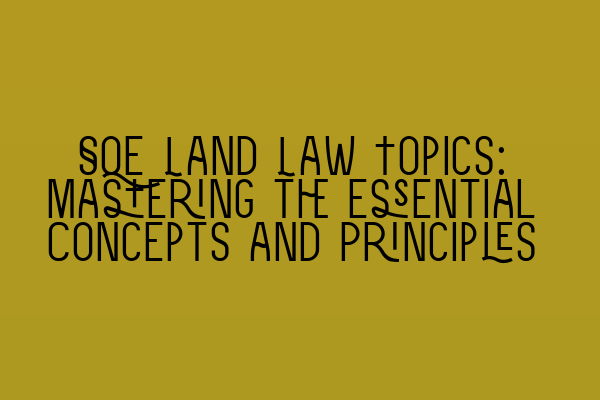SQE Land Law Topics: Mastering the Essential Concepts and Principles
As a law student or a prospective solicitor, having a solid understanding of land law is crucial. Land law forms a fundamental part of property law and is essential for any legal professional specializing in real estate transactions, disputes, or planning. In this blog post, we will delve into the essential concepts and principles of SQE land law, helping you gain a clear understanding of the subject matter.
1. What is Land Law?
Before diving into the intricate details, it is important to grasp the basic definition of land law. Land law primarily deals with the legal rights and responsibilities associated with the ownership, use, and transfer of land and property. It encompasses a wide range of topics, including property rights, leases, mortgages, easements, and more.
2. Legal Estates and Interests
One of the core concepts in land law is understanding the various types of legal estates and interests. These legal concepts determine the extent of a person’s rights and control over a property. Some common legal estates include fee simple absolute, life estate, and leasehold estate. Each type of estate carries certain rights and obligations, and a thorough understanding of these is necessary to navigate land transactions efficiently.
3. Co-Ownership and Trusts
Co-ownership is another crucial aspect of land law. It refers to the shared ownership of a property by two or more individuals or entities. Understanding the concept of co-ownership, including joint tenancies and tenancies in common, is essential when advising clients on property matters or handling disputes between co-owners. Additionally, knowledge of trusts, which can be used to hold and distribute property interests, is vital in real estate transactions involving multiple parties.
4. Land Registration
In recent years, land registration has become a fundamental part of the legal framework governing land law. Understanding the principles and procedures of land registration is important for both solicitors and clients. This includes knowledge of the Land Registration Act 2002, the role of the Land Registry, and the benefits and challenges associated with registered land.
5. Leases and Tenancies
Leases and tenancies are common in both residential and commercial property transactions. These legal agreements grant a person or entity the right to use and occupy a property for a specified period. Understanding key elements of leases, such as covenants, repairs, and termination clauses, is crucial when drafting, negotiating, or interpreting lease agreements.
6. Easements and Restrictive Covenants
Easements and restrictive covenants are important concepts in land law, particularly in relation to the use and enjoyment of property. Easements grant specific rights to use someone else’s land, such as a right of way, while restrictive covenants impose certain restrictions or obligations on the use of land. Understanding the principles and limitations of easements and restrictive covenants is essential when dealing with property disputes or advising clients on land development projects.
7. Mortgages
Mortgages are a common method of financing property purchases. Understanding the legal principles and procedures surrounding mortgages is crucial when advising clients on mortgage agreements, foreclosure, and repossession. Knowledge of the recent legislative changes and case law developments in mortgage law is vital to ensuring clients’ interests are protected.
8. Landlord and Tenant Law
Landlord and tenant law focuses on the legal relationship between property owners (landlords) and those renting or leasing the property (tenants). This area of land law covers topics such as rent, tenancy agreements, eviction procedures, and tenant rights and obligations. A solid understanding of landlord and tenant law is essential for solicitors involved in residential or commercial property management and dispute resolution.
Mastering the essential concepts and principles of land law is not only important for the SQE assessments but also for a successful career as a property law specialist. Whether it’s advising clients on property transactions, handling disputes, or navigating land registration procedures, a comprehensive understanding of land law will be invaluable.
For more in-depth articles on related legal topics, check out the following articles:
- Ethics in Contract Law: Navigating the Moral and Legal Dimensions
- Misrepresentation in Contracts: Unveiling Deceptive Practices
- A Closer Look at SQE Contract Law Syllabus
- SQE Contract Law: Analyzing Landmark Cases and Influential Judicial Decisions
- Contract Law for Services: Key Considerations and Best Practices
By immersing yourself in the intricacies of land law and staying up-to-date with relevant legal developments, you will be well-equipped to provide exceptional legal advice and representation in property law matters.
